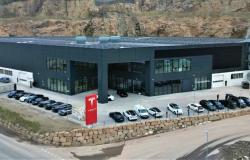
Jonas Gahr Støre loves the EEA agreement. I don’t think that’s taking my mouth too full. In any case, he has warm feelings for the treaty body, which is probably the closest we will get to full EU membership in our lifetime – and the next.
Then it is a paradox that the EEA agreement is historically unpopular on Støre’s watch. It is just as much a fact: Only 46 percent of Norwegians would vote yes if there was a referendum on the EEA agreement tomorrow, according to a poll Norstat has carried out on our behalf in Dagsavisen. We have to go all the way back to 2012 to find equally weak support for the agreement.
Do people believe them? Do they believe Støre in this matter?
Jonas Gahr Støre, who was in Brussels last week to celebrate the EEA Agreement turning 30 years old, believes opinion polls like ours show how important it is to defend the agreement and to talk more about what it means for Norway.
Støre may be right about that. The EEA agreement is in a way taken for granted by everyone. The supporters appreciate the agreement, but many of them would probably prefer to see us escape the whole thing and join the union itself. The flaming defenses of the agreement are therefore few.
The opposition to the agreement is not directly red-hot either. Only 23 percent of those questioned in the survey are clear that they would have voted flatly no in a referendum here and now. There are strong circles that like to point out the weaknesses in the agreement and would rather have been without it, some of them even sit in Jonas Gahr Støre’s government. But there are not many people who oppose the EEA agreement as their primary cause of action.
Keep yourself updated. Get a daily newsletter from Dagsavisen
Jonas Gahr Støre believes the EEA agreement contributes to “we have a stable and safe relationship with the EU” in a changing time, he tells Dagsavisen. Here, too, it is easy to follow him.
Then it becomes all the more difficult to understand why he and the government he leads, which is what we would call a centre-left project if we had observed the phenomenon in another country, have probably contributed more than most external factors to the fact that support for the agreement has fallen to a preliminary low point. It is nevertheless the closest explanation:
It is the electricity price that is the main reason why we Norwegians are less impressed by the EEA agreement today than almost ever before.
Put another way: It is the last two foreign cables that create difficulties for the EEA agreement.
Or in a third way: It is probably the government’s – in many people’s eyes – overly complicated response to the electricity price crisis which means that many do not see the value of the EEA agreement. Where many have called for clear answers in the social democratic tradition – you know, the one that contributed so much to our hydropower being controlled by the democratic Norwegian community – Støre and his crew have pointed to our European obligations.
Or on the EEA agreement, if you like.
Also read: Now it’s about taking back political control, writes Trygve Svensson
It could have been said in many other ways as well. For example, that the measurement was taken up after the EU’s energy commissioner Kadri Simson was in Norway at the beginning of March, and called Norwegian hydropower the European battery. She could also tell us that we must join the EU’s fourth energy market package, now rather than later, and that of course there will be many more power cables abroad in the future.
Then the government’s representatives stepped in and said that no, we are actually the ones who decide this. But the question is: Do people believe them? Do they believe Støre in this matter?
The support for the EEA in our opinion poll suggests that the answer to that is no, they don’t.
All the incantations and promises to use the room for maneuver in the EEA agreement that the Labor Party adopts at national meetings and speaks loudly about in opposition and even promises in the government platform, appear as hollow and empty words to many as long as they are not followed up with concrete action . When it really comes down to it, the party leadership almost always ends up with our European commitments being more important than the people’s demands here at home.
Also read: Former foreign affairs editor Erik Sagflaat on anti-Semitism as a hiding place
The electricity price has probably made this clear to many. During the electricity price crisis, Støre and the government have really been torn between two considerations: An attempt to make it livable for the population of a cold and one hundred percent electricity-dependent country all the way up north – and the desire to be good boys and girls in the eyes of the EU countries.
There are not a few texts that have been written about how the Labor Party and Støre themselves have chosen sides in this issue – for the EU. For example, political editor Harald Birkevold wrote this in Stavanger Aftenblad last year:
“Would Støre rather lead a small party that has the ‘right’ attitudes towards the EU and the power market, than a larger party that actually challenges and tests these mechanisms?” Yes I believe”.
Paradoxically, it may now look as if this willingness to follow the European trend has consequences for Norwegians’ relationship to European integration.
Of course, we should not exaggerate the importance of a single opinion poll. It is nevertheless a never-so-small warning for the European-oriented part of the government that the electricity crisis seems to have such a clear impact on people’s relationship with the EEA agreement.
It then remains to be seen whether it will cause the leadership of the Labor Party to change course in energy policy. It is unlikely – after all, the party has lost a local election and been beaten in the opinion polls for years now. Without budging an inch in energy policy and the relationship with the EU.
Read more comments by Jo Moen Bredeveien
Also read: The dream of Easter Mountain is a nightmare
Also read: Rita and Morten lose three million in pension: – It is so bitter
Tags: EEA agreement historically unpopular Labor Party challenge Dagsavisen
-




